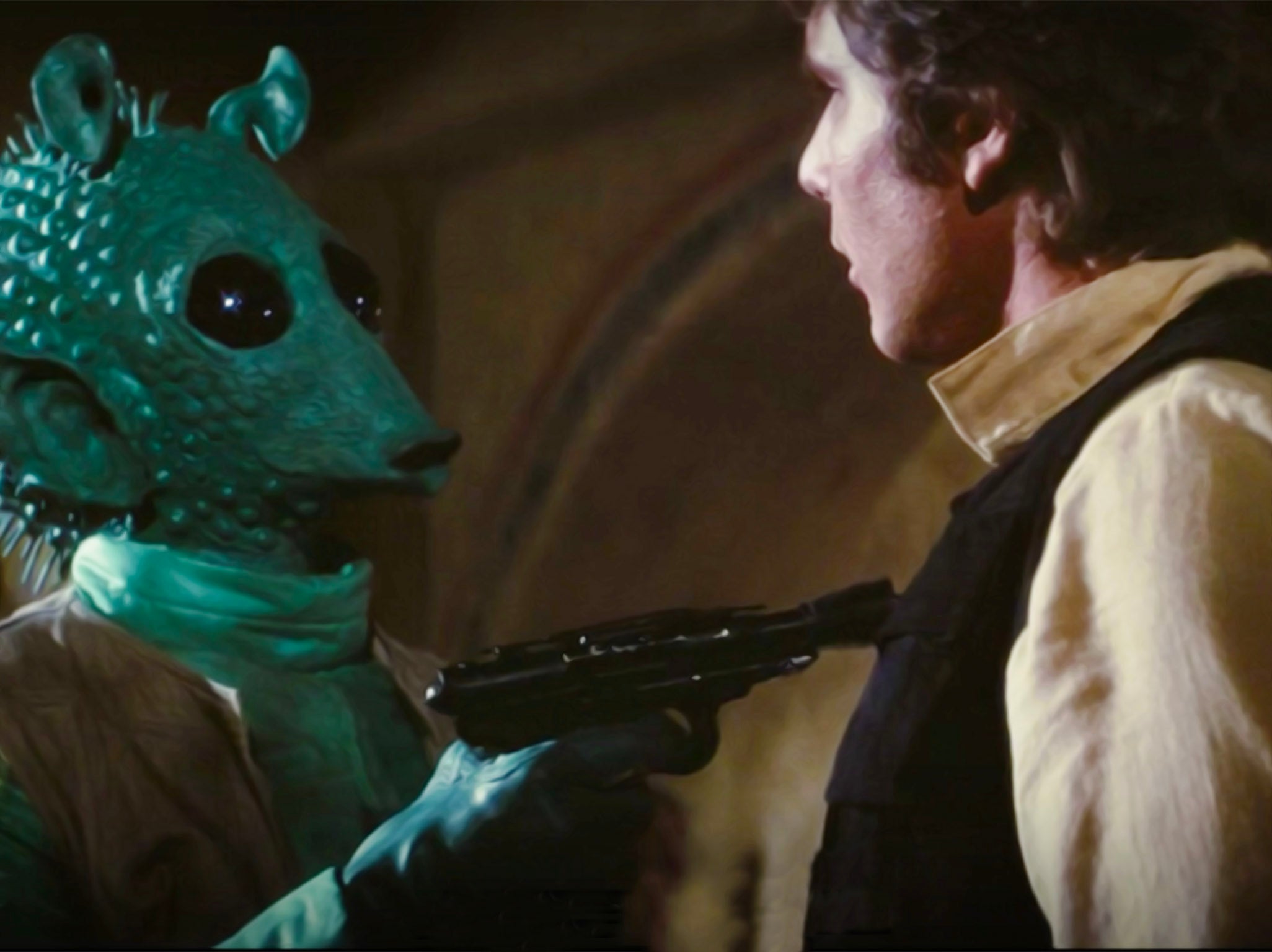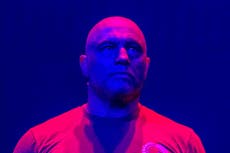‘Han shot first!’: How a single Star Wars edit sparked decades of discord between fans and franchises
Twenty-five years ago, George Lucas drew the ire of his own fanbase when he re-released the original Star Wars trilogy and radically altered a shootout between Han Solo and an alien named Greedo. Today, Louis Chilton writes, it feels like ground zero for the way we talk (and complain) about blockbusters


Exploding Death Stars. Duelling lightsabers. Interstellar dogfights. Star Wars: A New Hope had it all. For all the spectacular and instantly iconic scenes to feature in the film, it’s bizarre that its most controversial set piece is also its simplest: two characters sitting down at a table, shooting the breeze before shooting at each other.
The scene occurs about 50 minutes into the film, shortly after we’re introduced to Harrison Ford’s cucumber-cool smuggler Han Solo. Han is pressed into a diner booth by the bounty hunter Greedo – an alien curiosity with big, buggish eyes and green reptilian skin. Greedo points a gun at him, explaining that he’s here to collect on Han’s debts to local crime lord Jabba the Hutt. Han stalls for time, all the while suavely unholstering his pistol. Then, like a coiled snake, he strikes – shooting dead his unsightly foe. The scene was everything you needed to know about Han Solo. He was no saint, no hero. This was a man who would shoot first and look damn cool doing it. At least, that’s how it looked if you were watching it in 1977.
Twenty years later, this was not the case. In 1997, A New Hope’s director, George Lucas, oversaw a digitally remastered and revised re-release of the original Star Wars trilogy. The majority of Lucas’s alterations could at best be described as benign but unnecessary – a previously deleted scene was restored with a CGI Jabba the Hutt; exploding planets were given extra visual oomph. But one change proved too much for fans to stomach.
The fateful meeting between Han and Greedo was changed to exonerate Han of all wrongdoing. Han no longer “shot first”. Instead, his alien foe somehow missed a shot from near-point-blank range, giving him the chance to rapidly fire in retaliation. Responses to the change ranged from diffident shrugs to incandescent rage: for some fans, this was a betrayal not just of the sanctity of the original film, but of Han’s very character. The backlash ballooned into one of the biggest fan-vs-creator debates of all time. In the process, it laid the template for a new era of tortured battles between fans and creators, from Ghostbusters to Justice League.
Subsequent re-edits of the film have tinkered with the details. A 2004 DVD release saw the two gunmen shoot almost simultaneously; the 2019 version added in some incomprehensible dialogue in which Greedo can be heard saying a gibberish word that many fans heard as “maclunkey”. The whole matter of “who shot who first and how” has become so muddied, it’d take an expert Cluedo player to get to the bottom of it.
Paul Blake, the actor who played Greedo, has spoken about the scene on multiple occasions, including in an interview with the New York Daily News in 2016. Asked what his thoughts were on the “Han shot first” debate, he replied: “It said it all in the original script. We played the scene in English and at the end of the scene, it reads, ‘Han shoots the alien.’ It would be lovely to see them go back to the original version – I much preferred it, I must say.” Posed the same question, Harrison Ford’s reply was rather more pithy: “I don’t care.”
For his part, Lucas was clear about his reasoning for the change. “I never designed Han to be a ruthless killer,” he said. “All the good guys shoot in self-defence.” He has reiterated numerous times through the years that the Star Wars films are, first and foremost, aimed at children. The fact that so many of the franchise’s most ardent fans are now adults – and have been for decades – causes no small amount of friction when it comes to the tone and direction of the series itself.

Little did anyone know at the time, but the “Han shot first” furore was just the first in a series of protracted disputes between factions of the Star Wars fanbase and the franchise’s bearded figurehead. After 1997, Lucas would continue to make changes to the original Star Wars trilogy throughout the subsequent two decades, adding in peripheral CGI characters and upgraded effects. His prequel trilogy, beginning with 1999’s The Phantom Menace, was reviled by large portions of its audience for, among other things, being too juvenile in its tone. Disney’s multi-billion-dollar acquisition of Star Wars in 2012 took the series out of Lucas’s hands and him out of the firing line, but the struggles between fans and creators continued unabated. Whether it’s Rian Johnson’s polarising Last Jedi, JJ Abrams’ widely disparaged Rise of Skywalker, or the ill-fated Solo: A Star Wars Story, Disney’s commitment to glutting the market with Star Wars properties has long overshadowed any of Lucas’s so-called transgressions. The time for clutching pearls has long passed. And yet, for many, “Han shot first” still stings like a laser blast to the gut.
Josef Benson, author of Star Wars: The Triumph of Nerd Culture, says the franchise’s revolutionary approach to merchandising helped sow the seeds of anti-Lucas backlash. “[With A New Hope], Lucas was interested in creating a mythology, and from the very beginning, fans wanted to take part in it,” he says. “As millions upon millions of action figures flooded the market, Star Wars as a mythology was making an indelible mark on the minds of a whole generation of kids. In this way, fans of the film began to feel a sense of ownership vis-a-vis the films unlike anything that had come before.”

Watch Apple TV+ free for 7 day
New subscribers only. £9.99/mo. after free trial. Plan auto-renews until cancelled.
ADVERTISEMENT. If you sign up to this service we will earn commission. This revenue helps to fund journalism across The Independent.

Watch Apple TV+ free for 7 day
New subscribers only. £9.99/mo. after free trial. Plan auto-renews until cancelled.
ADVERTISEMENT. If you sign up to this service we will earn commission. This revenue helps to fund journalism across The Independent.
Though the initial reaction to the news that Lucas was updating and re-releasing the original trilogy was widely positive, the tide turned when they realised just what this meant for their treasured originals. “For fans, this was a power move that made it clear whose world Star Wars actually was,” says Benson. “Many felt as though the movies were no longer Lucas’s to change. The so-called flaws in the films were actually what affected people the most, not unlike the cigarette lodged in one of Jackson Pollock’s oil paintings.”
With Lucas’s various re-edits now the only widely commercially available versions of A New Hope, it raises a question: who is responsible for preserving the original, charmingly blemished Star Wars experience? Some fans have taken the onus on themselves. Fan-made re-edits of the original trilogy have long circulated online, with restorations such as “Harmy’s Despecialised Edition” successfully attempting to replicate the original cuts of the films. It’s far from ideal, but these sorts of unofficial backchannels are sometimes how niche or otherwise “lost” films endure. It seems ludicrous to class a behemoth such as Star Wars as a kind of buried cinephile curiosity, but in its authentic, original form, it is.

In the grand scheme of things, Lucas’s reviled re-edits aren’t necessarily the egregious acts of cultural vandalism they’re sometimes made out to be. Dodgy restorations have always been part and parcel of Hollywood – consider the monstrous colourisations of Laurel and Hardy films, or the decision to replace guns with walkie-talkies in the 2002 re-release of ET (a decision Steven Spielberg later walked back). The question of whether Han is a cold-blooded killer – or simply a slow-handed manslaughterer – doesn’t really change the rest of the film too much. But it is a matter of principle. It’s a debate that is likely to persist long after Lucas has passed on, after Disney have franchised Star Wars into its umpteenth movie trilogy, and after “Son of the Mandalorian” has entered its eighth season. If there’s one thing these films have taught us, it’s that war is never truly over.
Join our commenting forum
Join thought-provoking conversations, follow other Independent readers and see their replies
Comments


Bookmark popover
Removed from bookmarks